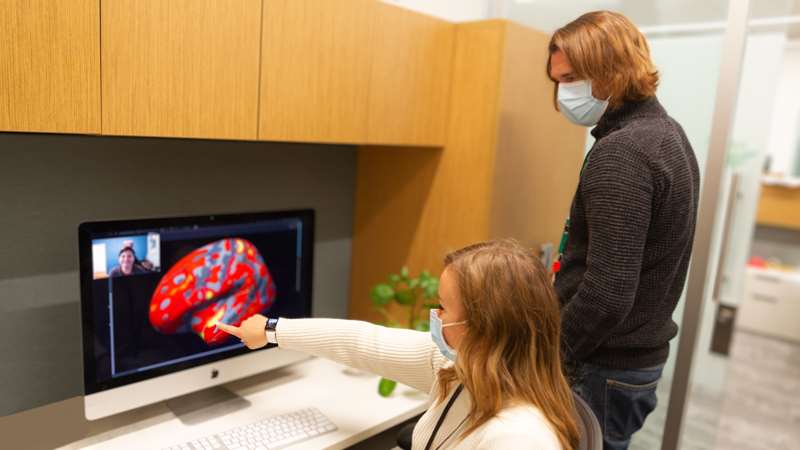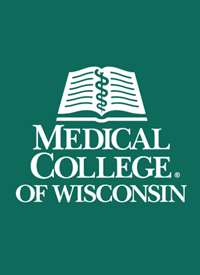Meier Laboratory
The Meier Lab seeks to identify mechanisms of the acute and chronic effects of mild traumatic brain injury, including sport-related concussion. Using a variety of approaches—including advanced magnetic resonance metrics (e.g., fMRI, diffusion imaging, structural imaging), blood-based biomarkers, and clinical/behavioral testing—we look to answer questions such as: how long does it take the brain to recover following an acute mTBI, what are the physiological mechanisms associated with prolonged recovery following mTBI, and what are the cumulative effects of repetitive sport-related concussion on the brain?

Research Areas
Cumulative Effects of Concussion and Contact-Sport Participation

The Meier Lab is actively involved in determining the effects, if any, of repeat concussion and contact-sport participation on brain function and structure. Our group was among the first to demonstrate that subtle differences in brain structure (e.g., smaller volumes) and function—such as altered resting state connectivity, more psychological symptoms—are present in otherwise healthy college-aged athletes with prior concussion compared to athletes without concussion. Similar associations have also been observed in athletes with extensive contact sport experience compared to those with no contact sport experience. These results were limited to football players in relatively small sample sizes. One of our actively funded projects (R01NS102225; PI: Meier) involves replicating these findings and extending them to non-football and female athletes. This project will determine the relationship amongst concussion/contact sport history, brain structure and function, and blood-based biomarkers of a common immunoregulatory pathway that has been implicated in a variety of psychiatric and neurodegenerative diseases.
Representative Publications
- Association of Previous Concussion with Hippocampal Volume and Symptoms in Collegiate-Aged Athletes
- Smaller Dentate Gyrus and CA2 and CA3 Volumes Are Associated with Kynurenine Metabolites in Collegiate Football Athletes
- Abnormalities in Functional Connectivity in Collegiate Football Athletes with and without a Concussion History: Implications and Role of Neuroactive Kynurenine Pathway Metabolites
Blood-Biomarkers in mTBI and Concussion

The Meier Lab is actively investigating the potential utility of blood-based biomarkers in concussion and mTBI. Blood-based biomarkers have promise as objective markers to supplement current clinical practice for decisions regarding injury diagnosis and identifying individuals at risk for prolonged recovery. For example, we have demonstrated that brain-injury markers, such as GFAP, are elevated following sport-related concussion and improve the discrimination of concussed athletes compared to discrimination using symptoms alone. In addition, we have shown that inflammatory markers, while not specific to concussion, are predictive of symptom-duration following concussion. Ongoing work funded by the NIH continues to identify novel markers and investigate the utility of these markers in other cohorts, such as women and military service academy members (R21NS118169; R21NS099789; PI: Meier).
In addition to their potential clinical utility, blood-based biomarkers can also help identify potential physiological mechanisms that put individuals at risk for developing negative outcomes following concussion and mTBI. Several of our recent and ongoing projects have focused on blood levels of a common immunoregulatory pathway known as the kynurenine pathway. While this pathway has been linked with a variety of psychiatric and neurodegenerative diseases, its role in mTBI has been underappreciated. The Meier Lab is investigating the association of blood levels of neuroactive kynurenine pathway metabolites with psychiatric sequelae observed acutely and chronically following TBI (R21NS099789; R01NS102225; PI: Meier).
Representative Publications
- A Prospective Study of Acute Blood-Based Biomarkers for Sport-Related Concussion
- Acute elevation of serum inflammatory markers predicts symptom recovery after concussion
- Mood symptoms correlate with kynurenine pathway metabolites following sports-related concussion
- The Kynurenine Pathway in Traumatic Brain Injury: Implications for Psychiatric Outcomes
Neuroimaging of mTBI and Concussion

Neuroimaging currently provides the most direct approach to studying the effects of TBI on the brain. The Meier Lab uses advanced MRI metrics—including task-based fMRI, resting state fMRI, diffusion MRI, arterial spin labeling, and structural MRI—to characterize the acute effects of mTBI and sport-related concussion on brain function and structure, as well as the time course of their recovery. Given our involvement in various MRI studies of concussion across several cohorts, we are also focused on leveraging and harmonizing MRI data from multiple prior projects to facilitate analyses of sport-related concussion on a scale that may not be feasible with single-site studies—e.g., potential moderating effects of sex.
Representative Publications
- Resting-state functional connectivity after concussion is associated with clinical recovery
- Recovery of cerebral blood flow following sports-related concussion
- Longitudinal assessment of white matter abnormalities following sports-related concussion
- Prevalence of Potentially Clinically Significant Magnetic Resonance Imaging Findings in Athletes with and without Sport-Related Concussion
The National Collegiate Athletic Association - Department of Defense Grand Alliance: Concussion Assessment, Research, and Education (CARE) Consortium

The CARE Consortium is a large, multi-site effort focused on characterizing the acute, intermediate, and cumulative/chronic effects of concussion and head impact exposure in NCAA athletes and military service academy members using head impact sensors, advanced MRI, blood-based biomarkers and genetics, and clinical testing, and the Meier Lab is critically involved in the blood and MRI biomarker work of the CARE Consortium Studies, including CARE 1.0, CARE 2.0, and CARE-SALTOS Integrated.
Representative Publications
- Prospective study of the association between sport-related concussion and brain morphometry (3T-MRI) in collegiate athletes: study from the NCAA-DoD CARE Consortium
- Cumulative Effects of Prior Concussion and Primary Sport Participation on Brain Morphometry in Collegiate Athletes: A Study From the NCAA-DoD CARE Consortium
- Association of Blood Biomarkers With Acute Sport-Related Concussion in Collegiate Athletes: Findings From the NCAA and Department of Defense CARE Consortium
- Resting-State fMRI Metrics in Acute Sport-Related Concussion and Their Association with Clinical Recovery: A Study from the NCAA-DOD CARE Consortium
Facilities
Funding
The Meier Laboratory receives funding on a continual basis from the Medical College of Wisconsin and on a per-project basis from such institutions as the National Institute of Neurological Disorders and Stroke (NINDS).
Current Members
Led by Lab Director and Principal Investigator Dr. Timothy Meier, the team at the Meier Laboratory specializes in Mild Traumatic Brain Injury in sport, military and civilian populations.

Timothy B. Meier, PhD
Professor

Lezlie Y. España, BS
Programmer Analyst II

Bryna Goeckner
Graduate Student (Meier Lab)

Jennifer Hill, MA, CCRC
Program Director, Brain Injury Research Program

Dan Huber
Senior Data Analyst, Brain Injury Research Program

Katie Krahn
Administrative Associate

Amy Nader
Clinical Research Coordinator, Brain Injury Research Program

Nicholas Weyenberg
Data Analyst
MCW Collaborators

Michael McCrea, PhD, ABPP
The Shekar N. Kurpad, MD, PhD, Chair in Neurosurgery; Professor; Vice Chair of Research; Co-director, Neurotrauma Research Center; Director, Brain Injury Research Program

Lindsay Nelson, PhD, ABPP
Professor

Benjamin Brett, PhD
Associate Professor
Center for Imaging Research
Medical College of Wisconsin
NRC
Medical College of Wisconsin
Adult Translational Research Unit
Medical College of Wisconsin
External Collaborators
Andrew Mayer, PhD
Mind Research Network
Jonathan Savitz, PhD
Laureate Institute for Brain Research
Kent Teague, PhD
OU-TU School of Community Medicine
Rebekah Mannix, MD
Boston Children's Hospital
Jessica Gill, PhD
National Institute of Nursing Research, National Institutes of Health
Alumni
Grace Amadon
Clinical Research Assistant II
Luisa Bohorquez, PhD
Postdoctoral Associate
Sam Bobholz
Laboratory Technician
Jaila Coleman
Research Assistant
Keeley Hamill
Clinical Research Assistant II
Mayank Kaushul
Postdoctoral Associate
Monica Keith (Giraldo-Chica), PhD
Postdoctoral Associate
Alex Kirk
Research Assistant
Ryan Lee
Medical Student
Katie Mau
Research Assistant
Morgan E. Nitta, MS
Doctoral Research Assistant
Jennifer Powell
Research Assistant
Kearnin Van Bortel
Clinical Research Assistant II
Get Involved!
Participate in Research
We are currently enrolling collegiate athletes to study brain health in sports. Participants will receive a stipend upon completion. Fill out this questionnaire if you are interested.
This study is being conducted in conjunction with the NINDS and the MCW Brain Injury Research Program.
Educational Opportunities
Students interested in Graduate Education in the Neuroscience of Brain Injury are invited to explore opportunities in the MU-MCW Joint Department of Biomedical Engineering, as well as the Neuroscience Doctoral Program at the Medical College of Wisconsin.
Join Our Team
The Meier Laboratory is always on the look out for individuals with an interest in the Neuroscience of Brain Injury. For general questions regarding open opportunities, contact Dr. Timothy Meier.
Recent Publications
-
(Meier TB, Muftuler LT, Goeckner BD, Weyenberg N, Huber DL, España LY, Banerjee A, Mayer AR, Brett BL.) Hum Brain Mapp. 2025 Nov;46(16):e70392 PMID: 41147238 PMCID: PMC12559924 SCOPUS ID: 2-s2.0-105020246130 10/28/2025
-
(Eagle SR, Huber D, McCrea M, Okonkwo DO, Harezlak J, McAllister T, Pasquina P, Broglio S, Meier TB, CARE Consortium Investigators.) Sports Med. 2025 Nov;55(11):2891-2903 PMID: 40560505 SCOPUS ID: 2-s2.0-105013771769 06/25/2025
-
Abnormal Pattern of Spondylosis and Postflight Neck Flexibility in Fifth-Generation Fighter Pilots.
(Stemper BD, Muftuler LT, Cutlan R, Strother C, Sherman KA, Meier TB, Raff H, Yoganandan N, Gerds B, Dooley C, Le P, Hainsworth KR, Vedantam A.) Aerosp Med Hum Perform. 2025 Oct;96(10):884-893 PMID: 41043817 SCOPUS ID: 2-s2.0-105017693987 10/04/2025
-
Regional and Global Changes in Brain Structure 1-Year Post Pediatric Mild Traumatic Brain Injury.
(Nathaniel U, Wick TV, Ling JL, McQuaid JR, Sasi Kumar D, Miller SD, Wu J, Zotev V, Meier TB, van der Horn HJ, Phillips JP, Campbell RA, Sapien RE, Keskin R, Vakhtin AA, Mayer AR.) Ann Neurol. 2025 Aug;98(2):341-353 PMID: 40476699 PMCID: PMC12235941 SCOPUS ID: 2-s2.0-105011250456 06/06/2025
-
(Bazarian JJ, Zetterberg H, Buki A, Dengler BA, Diaz-Arrastia R, Korley FK, Lazarus R, Meier TB, Mondello S, Moritz K, Okonkwo DO, Papa L, Phillips JB, Posti JP, Puccio AM, Sloley S, Steyerberg E, Wang KK, Awwad HO, Dams-O'Connor K, Doperalski A, Maas AIR, McCrea MA, Umoh N, Manley GT.) J Neurotrauma. 2025 Jul;42(13-14):1065-1085 PMID: 40393505 PMCID: PMC12409121 SCOPUS ID: 2-s2.0-105006897418 05/21/2025
-
Serum protein biomarkers for degenerative cervical myelopathy: a prospective study.
(Vedantam A, Rahman M, Salam S, Banerjee A, Satkunendrarajah K, Budde MD, Meier TB.) J Neurosurg Spine. 2025 Jun 01;42(6):718-726 PMID: 40215624 PMCID: PMC12624368 SCOPUS ID: 2-s2.0-105007067019 04/12/2025
-
Linking Symptom Inventories Using Semantic Textual Similarity.
(Kennedy E, Vadlamani S, Lindsey HM, Peterson KS, Dams O'Connor K, Agarwal R, Amiri HH, Andersen RK, Babikian T, Baron DA, Bigler ED, Caeyenberghs K, Delano-Wood L, Disner SG, Dobryakova E, Eapen BC, Edelstein RM, Esopenko C, Genova HM, Geuze E, Goodrich-Hunsaker NJ, Grafman J, Håberg AK, Hodges CB, Hoskinson KR, Hovenden ES, Irimia A, Jahanshad N, Jha RM, Keleher F, Kenney K, Koerte IK, Liebel SW, Livny A, Løvstad M, Martindale SL, Max JE, Mayer AR, Meier TB, Menefee DS, Mohamed AZ, Mondello S, Monti MM, Morey RA, Newcombe V, Newsome MR, Olsen A, Pastorek NJ, Pugh MJ, Razi A, Resch JE, Rowland JA, Russell K, Ryan NP, Scheibel RS, Schmidt AT, Spitz G, Stephens JA, Tal A, Talbert LD, Tartaglia MC, Taylor BA, Thomopoulos SI, Troyanskaya M, Valera EM, van der Horn HJ, Van Horn JD, Verma R, Wade BSC, Walker WC, Ware AL, Werner JK Jr, Yeates KO, Zafonte RD, Zeineh MM, Zielinski B, Thompson PM, Hillary FG, Tate DF, Wilde EA, Dennis EL.) J Neurotrauma. 2025 Jun;42(11-12):1008-1020 PMID: 40200899 PMCID: PMC12169902 SCOPUS ID: 2-s2.0-105003163542 04/09/2025
-
(Bartels HM, Van Bortel KM, Mayer AR, Brett BL, Meier TB.) J Head Trauma Rehabil. 2025 Apr 07 PMID: 40203002 SCOPUS ID: 2-s2.0-105004369429 04/09/2025
-
(España LY, Brett BL, Mayer AR, Nencka AS, Swearingen B, Koch KM, Meier TB.) Hum Brain Mapp. 2025 Apr 01;46(5):e70213 PMID: 40230033 PMCID: PMC11997015 SCOPUS ID: 2-s2.0-105003301388 04/15/2025
-
(Nathaniel U, Erhardt EB, Kumar DS, Wu J, Miller SD, Chauhan P, Keskin R, Wick TV, Yeates KO, Meier TB, van der Horn HJ, Phillips JP, Campbell RA, Sapien RE, Mayer AR.) Int J Clin Health Psychol. 2025;25(3):100600 PMID: 40678189 PMCID: PMC12269848 07/18/2025
-
(McQuaid JR, Wick TV, Ling J, Dodd AB, Kumar DS, Nathaniel U, Miller SD, Zotev V, van der Horn HJ, Phillips JP, Campbell RA, Sapien RE, Meier TB, Mayer AR.) Neuroimage Clin. 2025;48:103837 PMID: 40651061 PMCID: PMC12275868 SCOPUS ID: 2-s2.0-105010225909 07/13/2025
-
(Nathaniel U, Erhardt EB, Kumar DS, Wu J, Miller SD, Chauhan P, Keskin R, Wick TV, Yeates KO, Meier TB, van der Horn HJ, Phillips JP, Campbell RA, Sapien RE, Mayer AR.) International Journal of Clinical and Health Psychology. 1 July 2025;25(3) SCOPUS ID: 2-s2.0-105009302200 07/01/2025
Contact Us
Meier Laboratory
(414) 955-7300


